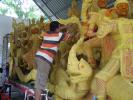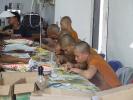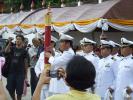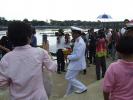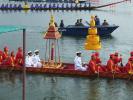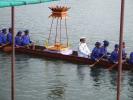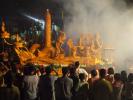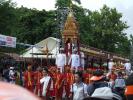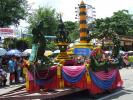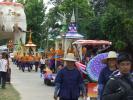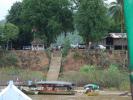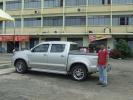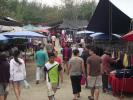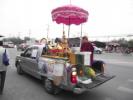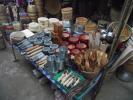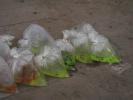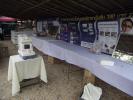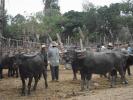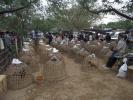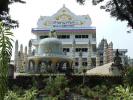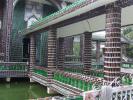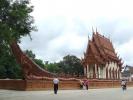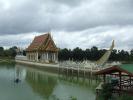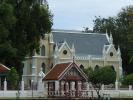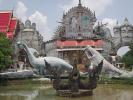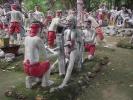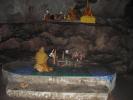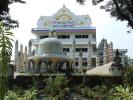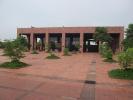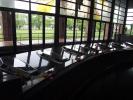-
Posts
211 -
Joined
-
Last visited
-
Days Won
1
Content Type
Profiles
Forums
Events
Everything posted by ceejay
-
I'm another organiser. Like Fountainhall, I have a 2 compartment wallet and use one for 500's and 1000's, one for the rest. I keep a few 20's in a shirt pocket for baht bus fares. If I'm going out withour a wallet, then I wear a shirt with 2 button down pockets, one for 500's and 1000's and one for the rest.
-
Thanks for your input S-G. Yes, the service does end if you don't make a minimal top up once a month. However, I have a Thai bank account and I can top up 50 baht a month online. Worth it to keep the service. Actually, it will only be 30 baht a month. On the service I have, if you have more than 30 baht in the account, you can phone a free number which automatically extends the life of your credit for another month. AIS text a reminder to me, just before the credit expires. It costs 30 baht (you get 30 free minutes inside Thailand, valid for 5 days). So, with roaming, you could keep a number active for 11 months by starting with 400 baht or so in there, even without a Thai bank account. It's certainly worth it to me to keep the number. I have just returned from a 5-month stay in Chiang Mai, and plan on doing the same thing again this year. The number is linked to my bank account, and there are people in CM who I will be seeing again who have my number on their phones.
-
For my recent stay in Thailand I bought, as usual, a 1-2-Call pay SIM, bog standard cheap pay as you go type. Cost 90 baht if I remember rightly. When I got home to England I switched the phone on to retrieve a number from it and was surprised to get a text message from AIS saying that I was now set up for roaming and giving a free number to call to confirm it. So I did and now I am connected to the Orange network here, Totally unexpected, and excellent news for me to because I can now receive one time passwords for internet banking on my Thai account. It also means, I believe that someone in Thailand can call me on the number at local rates. I shan't be encouraging that - I guess it will cost me a packet. I have a text that sets out the charges, but it's in Thai and I can't read it. 23baht and 30 baht are mentioned - I'm guessing one is the cost of a text and the other is the cost of a minute's speech. Anyone who knows what the charges are for definite, I'd be grateful.
-
For weeks, during my stay in Thailand, I have been having log in problems. Although I have been logged in and can access my account maintenance page and private messages, I have not been able to post on the message board. That's because the message board itself showed either the message "Please log in to post a new topic" or "Please log in to post a reply" even though I am logged in. Very occasionally I got to post a topic. The other strange thing is that although I could access my PM inbox, trying to open a PM opened a new window to my account maintenance page. Well, I am home from Thailand now (Boo hoo!) and on my home internet. I am using the same computer I Had with me in Thailand,.As you can see, I can now post, so I can only guess this was something strange about my internet access in Thailand. But I still go to the account maintenance page when I try to open a PM. Strange! (Fountainhall - I will reply to your PM, really, if I ever find out what it says!)
-
Strictly speaking a cemetery is a burial ground and that is the sense in which I was using it. What is unusual in Wat Muang is an area of Chinese type tombs in which the remains of the deceased are interred, as opposed to being kept above ground in Chedis, walls, columbines or similar repositories.
-
I would have replied to this days ago, but I have been having log in problems. The Isaan has some wonderful festivals, and I have been to several of them, including the Ubon Ratchathani Candle Festival. I have had it in mind to make some posts giving an overview of these, but have been prevented by laziness so I'll tag the first of them onto Fountainhall's post if I may. One of the strange difficulties in arranging a visit to these festivals is finding out when they are! Mostly, the date is determined by the lunar calendar, and often websites like the Tourist Authority of Thailand don't give an actual date until a month or two in advance. Not much use, if you are planning and booking a holiday 6 or 9 months ahead. The difficulty with the Candle Festival is that it is part of the larger Ubon Ratchathani International Wax Sculpture competition, which lasts for all of July, and this is all the information you get on the TAT website. The Candle Festival Parades (there are actually three) take place on the Buddhist festival days of Asanha Bucha (night parade) and Wan Khao Pansa (the day after Asanha Bucha - the main daytime parade and another night parade). Asanha Bucha is one of Buddhism's holiest days and a public holiday in Thailand and so finding this date is the easiest way of determining the date of the Candle Parade, although the date was not known for certain in 2012 until quite late on because of the occurence of a "repeated month" in the Buddhist calendar. It took place on 3rd August (which is about as late as it can be and would have been a problem to anyone who believed the TAT website which said the festival ended on July 31st). Wan Khao Pansa is the start of the Buddhist Rains Retreat, when monks are required to remain in their "home" Wat for a period of 3 months. It is traditional to present them with candles and clothing on Wan Khao Pansa, and this is the cultural foundation of the Canlde Festival. If, a day or two before Asanha Bucha, you go around the various Wats in town, you can see the floats being prepared. It's all done by hand - the monks are preparing thousands of little fretwork wax panels which are appliqued onto the candles and carvings: The ceremonies begin on Asanha Bucha with the presentation of the Royal Candle and Royal Loin Cloth. They are taken from Wat Luang (near the bridge over the Mun River) to Wat Supattanaram, to be kept there overnight, each to be paraded on it's own float the next day. They are taken by river, each with it's own barge. There is an escort of oared longboats which covers the river from side to side. The crews' unforms are red, white and blue to make a waterborne Thai Flag. The evening of Asanha Bucha day, after dark, there is the first parade of the floats through the city: The following day, starting quite early in the morning (8.30 or 9.00) is the main, daytine candle parade: The Candle Parade is a "Festival of Festivals". All of the local Wats have there own candles and floats, and many parade them locally before the main festival. This was at Wat Muang. I cam on it quite by accident - I was just visiting the Wat and had no idea this was happening: I have always taken the opportunity on these Isaan visits to see around the area, to visit places that I might not otherwise go to. I travelled out from Bangkok by road on this occasion, taking in Bang Pa In Palace, a retreat near Ayuttayah built by Rama V, notable for it's eccentric architecture: Then went on to Phimai to stay overnight, because I wanted to visit the Khmer temple there (one of the best preserved in Thailand) I made side visits from Ubon itself to the Sirindhorn Dam (no pictures because it rained all day) and the "Mekong Mooscape" (a rocky stretch of the Mekong pitted by many potholes) (no pictures because it was underwater.) There were more successful side trips to: Khong Chiam on the Mekong where you can make a (strictly speaking illegal) exit from the country to make a trip to a Lao market on the opposite side of the river. You get a day ticket for 100 baht from the Lao immigration office where you land: Sao Chaliang National Park, which has some striking natural rock formations that look like Breton dolmens: Pha Taem, which is close to Sao Chaliang and has the oldest prehistoric cave paintings in Thailand: Where I stayed: The Sri Isaan Hotel. Typical budget Isaan hotel with very small rooms, but clean and adequate. Ideally situated - it's no more than 5 minutes walk from Wat Luang and 10 minutes from the street where the parades take place: http://www.sriisanhotel.com/ Don't bother emailing them. They don't reply. I got Suphot to phone them and book a room for me. How I got there and travelled around. I hired Suphot (Smiles' better half) seen here with his car. You can have no better driver or guide for the Isaan (or anywhere else in Thailand) than Suphot. Knowledgeable, a safe driver and very committed to serving his customers, he can be contacted at suphot.tours@gmail.com
-
Only one party - the Communist Party of Vietnam. One of the advantages of running a totalitarian system is that, no matter how foolish, illogical, venal or brutal official policy may be, everyone agrees that it is a good idea. That's not to say that Scottie's interpretation is accurate. I have no idea about that. I would point out, though, that if the Vietnamese change their laws to recognise same-sex marriages entered into under the laws of other jurisdictions, without allowing for marriage in their own, then that will put them ahead of some US states.
-
To forecast the impact of the 787 problems on Boeing's profitability, you really need to take a close look at the balance sheet. The current bottom line is not that informative by itself. They will have made provisions for contigencies on the project - in effect deferring current real profits to cover future possible losses. Large companies, especially in high tech industries, will have whole teams of accountants looking for legitimate provisions and probably negotiating them with the tax authorities too. That's because, since a provision is effectively accounting for a loss, the cash allocated to it is not taxed (that is a massive oversimplification, but the principle holds). So, if the costs are covered by adequate provsions, they have no impact on current profitability at all. The loss has already been accounted for. Cash flow is another issue, because they need real money to pay compensation claims. The real pressure is on liquid assets and this may result in an increased borrowing requirement. That does have an effect on profitability. Don't forget though that a company like Boeing has a business providing maintenance, spares and service for existing aircraft that are already in use. That's going to be an excellent business - assured revenues for decades with little in the way of development costs. (In fact, if you look at the accounts of some high tech capital equipment companies, they are effectively service organisations that supply capital equipment as a loss leader to ensure the business stream for their service activities)
-
Ever been told a "sick buffalo" story? Well now you can, if you are in the Chiang Mai area, check out the price of a buffalo and even buy one, to make sure the money is spent as intended! Returning from a trip to Doi Inthanon a couple of weeks back, the driver pointed out a place on the Chiang Mai-Hod road to me and said it was the Saturday Buffalo Market, where farmers from miles around come to buy and sell buffalo. Well, I had to see that - it's one of those places that you can end up regretting not seeing while you had the chance. Buffalo are not much used as agricultural animals now, and it's hard to see a market like this lasting for ever. It starts before dawn and is all over by about 1.00 pm so I was up at 5.00 and, along with Bob and the same driver, off at 6.00 to go there. What a surprise! The market is enormous, and sells everything. It extends for about three quarters of a mile along both sides of the road, and this picture is of a lane leading away from the road, so you can see how deep it goes: It's so big that it even has its own permanent police booth, although it only runs for half a day a week. Spiritual matters are attended to as well - there were mobile shrines on both sides of the road, with monks handing out blessings to those who needed them: The diversity was enormous: household goods, computer equipment, used motor bikes, clothes, food, agricultural implements, artificial flowers - you name it: You could even get goldfish: Or have an eyetest if you wanted one. There was a fully equipped opticians in a roofed, but otherwise open stall: and, of course, there were buffalo - lots and lots of them (along with other cattle). The farmers were doing what farmers do at markets all over the world - looking over the animals and chatting amongst themselves: The wicker cages are for fighting cocks. The men in that circle in the background are fighting their birds (much less brutal than in some countries. The birds have their spurs removed and, when a bird is getting the worst of it, the owner pulls him out of the ring: The market is as big as Chatuchak, and more diverse (have you ever seen buffalo in Chatuchak?). It's also a local market for local people - Apart from myself and Bob, I only saw 2 or 3 other farang there. If you're in Chiang Mai and get the chance, go out there and see it - it's a chance to see a bit of Thailand as lived in by Thais, and it won't stay the same for ever.
-

Mediterranean Diet Cuts Heart Disease Risk, Massive Study Finds
ceejay replied to TotallyOz's topic in The Beer Bar
There's an old Schwabian saying, that I was taught by a German colleague many years ago: "There are two things no man ever knows, what's in the mind of a woman and what's in a liver sausage" -
I think the defining feature of a democracy is to provide a lawful and peaceful means of removing people from power and, for it to function, those in power have to accept it. The alternatives are either dictatorship, or a country where successive governments are removed by revolution or military coup. I don't entirely agree with Khor Tose that defence of minority rights denies the existence of a true democracy. The "Rule of Law" goes back a long way in English history, to Magna Carta (although the importance of that lies in its establishing the principle that government itself is subject to the Rule of Law, rather than any particular provisions in it). The 1689 Bill of Rights (much of which is still in force) can be seen as a statement that freedom of conscience is an over riding right that is in the interests of all - majority and minority alike, within the framework of democracy. (Of course, at the time and for nearly 150 years afterwards, that did not include being Catholic. Still doesn't, if you have ambitions to be, or to marry, the monarch).
-
<p>Indeed. The article from Flyertalk is a glib dismissal of real risks. The author of it is welcome to fly the Dreamliner for as long as it takes to convinve me that it is safe to do so.</p> <p>There are other issues he fails to address:</p> <p>1) Engines burn huge amounts of fuel at high temperatures. It's what they are designed to do and the processes are well understood, making the design of a containment system reliable. Indeed, an engine is by definition a containment system - you can't convert the energy to useful work without containing and releasing it in a controlled way. This is a necessarty risk - you have to take it in order to fly.</p> <p>2) There is a difference between necessary and unnecessary risk. Without an engine burning fuel, the plane would not fly. The plane does not need a battery that catches fire and should not fly with one. This is one of the reasons that smoking was banned in planes - as an unnecessary risk,.</p> <p>3) How do you certify the containment system? Plainly, Boeing do not understand fully how these batteries work, and they certainly have yet to identify the cause of their failure. That being so, how do they predict the nature of the worst case failure? How can they demonstrate that the containment system is adequate to cope with an unknown?</p>
-
Am I being fussy, or is the idea of flying over the Pacific in a plane with components that require special containment in case they catch fire as deeply unattractive to all of you as it is to me?
-
There's a limit to the degree you can run your private finances (barring big investments like a pension fund) as if you were a business. My main concern is cost control, rather than absolute cost. A few years back, I was planning a long trip to Laos, and the pound was sinking then. I bought a few thousand US dollars to fix a rate which kept the holiday in budget. The fact that the pound improved again before I took the holiday was beside the point - what mattered was that I had guaranteed that the cost was not going to run away from me. Other than that, what I do is plan conservatively. For example, I shall, if the rate stays at 45 or thereabouts, budget my next stay at around 40 baht = £1.00. Now that I have a Thai bank account I will probably, and sooner rather than later, transfer enough funds for a 6-month stay into baht. That may or may not be the best rate available to me between now and November, but it will be one I can live with. Loss of interest is irrelevant. UK rates are so low at the moment you might as well keep your money in a sock under the bed.
-
I have only used Agoda a few times, always with a credit card and no problems of any kind. As Fountainhall says, it's always worth checking the hotel's own website for a price comparison - it can be the cheapest. I have found a number of benefits from using Agoda: Some hotels (such as the Rose in Bangkok) ask for credit card details to be sent to confirm a booking. They ask for this to be done by normal, unencrypted email - I hate that idea! So, I'll use Agoda to avoid doing it. Some hotels (esepcially in the more rural parts of Thailand) do not reply to emails. Booking via Agoda may be the only option. I have, on one occasion, booked a hotel through Agoda (The PhuPhanam Resort in Dansai) to visit a local festival (the Phi Ta Khon). The hotel was charging a near 100% premium for festival time, but I got it via Agoda at the standard rate, Generally, I find Agoda has a much better range of hotels (from guest houses to 5 star resorts) than any other site I have used. They also cover some very out-of-the-way towns.
-
To make a post on the "Wats" thread, I had occasion to look up Sala Keo Kou in Wikipedia. Included in the entry is this little gem: This is a picture of the main building at Sala Keo Kou It seems to me that, if the people who built the place call it Sala Keo Kou, and put that up on the wall, then that is what it is called. Any discussion of what it should be called is impertinent at best, arrogant at worst, and a load of pretentious, self-important bollocks either way.
-
How many times have you heard a visitor say "Once you've seen one wat, you've seen them all" or something like that? I've seen the expression "watted out" used on some travel blogs. I for one will never be "watted out". The variety is endless. Apart from the classical wat styles there are many wats that are one of a kind, often the vision of one man. These are a few of them: Wat Lan Kuad in Sisaketh, which is constructed entirely from recycled bottles Wat Muang in Ubon Ratchathani, which has not one but two "boat" buildings. It is also the only Wat I have ever seen with a cemetery in the grounds - the Wat has a strong Chinese influence Wat Nong Bua, also in Ubon Ratchathani, which follows the layout of the Mahabodhi temple in India, located on the spot where the Buddha is believed to have found enlightenment. This is a coin operated fortune telling machine in Wat Nong Bua (something very Thai about that!) Wat Nivet Thamaprawat, in an island on the Chato Praya river. It is part of the Bang Pa In palace complex. Can best be described as being in Portmerion Gothic style (complete with stained glass windows showing events in the life of the Buddha) Wat Pan Non Sawan in Roi Et province. The grounds are full of statues of animals of all sorts, including dinosuars outside the main entrance. It also has a large, and lurid "Hell Garden" They don't have to be buildings either. Huai Bon cave in Fang is, I believe not technically a Wat. It has a community of forest monks, however, and the "temple" is a series of linked underground caves. They don't have to be Buddhist, either. Sala Keo Kou (also known as Wat Khaek) in Nongkhai is another Wat with an extensive sculpture garden. It was the personal vision and work of a Lao called Bunleat Sourirat and the main building is now his mausoleum. The community there describe themselves as a "lay contemplative community" rather than a religious one (although the iconography is Buddhist and Hindu) Wat Ban Song Khon in Mukdahan is Catholic, a shrine to the "Seven Blessed Martyrs of Thailand. It's an extraordinary building, reputedly the largest Catholic church in SE Asia. One of the more macabre features is effigies of the seven martyrs, laid out in coffins with glass lids.
-
I can't see thwe UK government ever funding expat retirement, but It certainly makes sense economically, at least in some cases. It's not just that the healthcare is cheaper - for me, at least, my health is significantly better. I've spent the last 16 weeks in Chiang Mai with barely a twinge from arthritis, as opposed to what would have been 3 months of minor, but more or less constant pain in the English winter. I reckon that coming here for the winter will keep my mobility for an extra 10 years plus - which years might well otherwise require some level of provision of care. One of the issues for a foreign government, though, is an open-ended commitment with the major costs denominated in a foreign currency. The cost/benefit ratio could change significantly with changes in exchange rates. That makes it an uncontrolled cost and, quite rightly, the Treasury hate that.
-
About that. Maybe a little more, but it helps if you don't eat all that much (which I never have) and have simple tastes (which I always have). Typically, I'll have a large plate of fruit, fruit juice, bread, cold meat or cheese and a yoghurt for breakfast. Costs me about 70 baht on average. I don't usually have lunch (haven't for years). Typically, the evening meal is at a local Thai restaurant - something on rice and a plate of Somtam. Usually runs to about 100 baht. That's not me being cheap. That's the food I prefer and it pretty much follows the pattern of what I eat in England. Actually, it is one of the items that is running in way under budget for this stay. I'd allowed for 1500 a day excluding accommodation for all spending- it's coming in at more like 1500 a day with. It doesn't include another 4-500 baht a week for the two times I do have lunch, one when I meet a friend for a walk around town and something to eat along the way, and the Sunday buffet at a hotel in town where a group of expats meet for brunch. Those I'd count as social/entertainment.
-
I retired early on the 1st May last year. It was unplanned - the company I worked for moved towns and I took early retirement course, retiring at 58 means that my occupational pension is a good deal less than it would otherwise have been. I've been livng in Chiang Mai for the last three months and will be here for another two. The main thing I have learned is that you can actually live in Thailand for much less money than 70K baht/month. I am living in a good one bedroom apartment in a nice part of CM on the Huay Kaew Road. Basic costs are as follows: Apartment, including water, electricity, internet, cleaning and linen - 15,000 per month Food about 6,000 per month Other (laundry, toiletries etc) about 3,000 per month Long term (6 month policy) travel insurance baht 2500/month Share of cost of ticket to Thailand baht 10,000/month So, including the cost of getting here, the basic cost to me is about 36,000 a month. That's living in a decent apartment with a separate living room in a nice part of Chiang Mai. I don't actually live on that: I have taken trips to Nan, Fang and Luang Prabang and will be taking others before I go, I am taking Thai lessons and I go out for a drink when I feel like it. Still, I am not spending more than 45,000 a month. A couple of comments: I could do it for less, especially on the accommodation item. If I had to, I could live adequately here for less than 25,000 a month and still have a better standard of living than someone living on a state pension in England. It does not include anything for visiting boy bars. I don't - when you have more time available you can look around for friends who do not expect to be supported.
-
I have a GayRomeo account. Twitter doesn't interest me and I will never have a Facebook account because their past security lapses and their continuing cavalier attitude to the privacy of personal information (the Instagram fiasco being the latest) convince me that they cannot be trusted technically or ethically.
-
I have just caught up with this thread. I don't think the traffic disruption will even be noticeable. Cars will be directed to an alternative area where they will be gridlocked - as usual - and motorbikes can be ridden along the sidewalks - as usual.
-
The rooms in the Rose are clean, well maintained and up to date, but the standard ones are, in my opinion, a bit on the small side. I would suggest booking through Agoda or some similar booking agency. When I booked direct with them they asked me to email my credit card details to secure the room. That's not something I care to do. Agoda have some cheap rooms described as "corner rooms". I'd avoid them - they are very small and an odd shape too. Ruen Arai is a great restaurant. The breakfast (served in an area near reception) is also good and the staff, as other have said, excellent. The location can't be beat and the pool, if you want it, is unmatched for a hotel in this area and price range.
-
No. How would you know the truth of it? How would you know that it was fair comment and not a vindictive act based on some personal vendetta? How would you give the individual involved the right of reply? How would you protect the board from being accused of libel?
-
Rather than on a phone, I keep a digital copy of my passport in the cloud. I use BT Digital Vault. There are many other similar services. Along with the passport there are other documents - travel insurance, list of contact numbers, important passwords etc. This way, even if I lost absolutely everything I would still have quick access to these documents.



